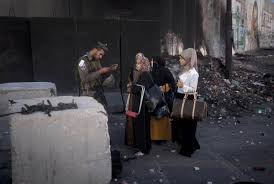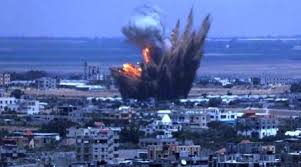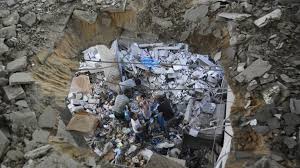‘Keyboard resisters’ give vital voice to Gaza
By Rania Zabaneh
“Palestinian youths are building resistance on social media, but not everyone is convinced online activism is effective.”
Ramallah, occupied Palestinian territories – Around the same time every day, they discuss the plan, deciding on the zero hour and hash tag before launching their attack. “Social media started revolutions,” Mahmoud Hrebat told Al Jazeera. “It is a tool not to be underestimated.”
This small group of Palestinian social media activists have decided to fight for Palestine in the virtual world. A couple of years ago, they started using Twitter and Facebook to raise awareness and mobilise support for Palestinian prisoners on hunger strike in Israeli jails; they have been spearheading online campaigns ever since.
Hrebat, a 31-year-old local radio show host, boasted about how Palestinians successfully re-appropriated a hash tag launched by Israeli activists last month. #BringBackOurBoys was the slogan for an internet campaign calling for the release of three teenage settlers believed to have been kidnapped near Hebron on 12 June.
“#BringBackOurBoys was there, we jumped on the wagon and told the story of our boys instead,” he said.
A lot has happened since. Israeli forces launched a massive arrest campaign in the West Bank, the young settlers were found killed, and Israel demolished the homes of Palestinians it accused of committing the attack.
Later, a 16-year-old Palestinian was burned alive by Israelis in Jerusalem, and, most recently, a war has been waged on the besieged Gaza Strip.
And on every occasion, they were ready with a hash tag.
RELATED: Palestinians denounce West Bank leadership
Meanwhile, Israel itself has also developed a strong presence on social media, with its military spokesperson’s office counting 304,000 followers on Twitter, and the government recently boasting that it was using a network of young international visitors to Israel to promote a positive image of the country’s ongoing military operation in Gaza.
Pro-Israel activists participating in the government-sponsored Masa Israel programme “post on Facebook and Twitter, respond to falsehoods, expose Hamas lies, share explanatory YouTube videos, and attempt both raise awareness and challenge the discourse on social media,” the government stated in a recent press release.
“This is a critical partnership for all those taking part in the public diplomacy war room, particularly at a time like this, when the other side is fighting us on social media in an effort to win hearts and minds,” said Masa chief executive Liran Avisar Ben Horin.
Israel’s prime minister’s office was also caught buying Tweets to support the military escalation in Gaza.
Many Palestinians believe social media provides them with an opportunity to tell their side of the story, picking up where mainstream media has failed. With Internet access available in more than half of all Palestinian households in the occupied West Bank and Gaza Strip, a glimpse of every day life under Israeli occupation is now just a click away.
As more than 255 Palestinians have been killed and more than 1,900 others injured in the ongoing conflict in the besieged Palestinian enclave, pictures of victims have been going viral on the web, in an attempt to stop the aggression against Gaza.
Dozens of Facebook pages have been created against the latest escalation. Pages like Gaza Under Attack, The Palestine Project and The Innocent Children of Gaza have gathered thousands of likes in less than a week, while older pages created to share news from Gaza have been gaining followers.
In some limited cases, older pictures from Gaza or elsewhere in the region were posted to demonstrate the continued Israeli attack. “I don’t think it’s intentional. The reality is harsh enough,” said Hrebat, about the misleading photos.
Nonetheless, activists are concerned about the use of pictures and are asking their friends and followers to triple check and avoid using graphic ones. “We can’t afford to have people lose trust in the message,” Hrebat said.
Social media has also been used as a tool to try to mobilise people on the ground in Palestine.
Hundreds of groups are created on the web whenever there is an Israeli escalation, and thousands of Facebook likes are harvested. Invitations for demonstrations that used to take hours to distribute during the first and second intifadas are now shared in a second.
But when local events are organised using social media, they often fail to rally a great deal of support on the ground.
“Everyone is glued to a screen,” Issam Bakr, the co-ordinator of several Palestine Liberation Organisation-related political parties in Ramallah, said. “They think they have done their duty with a like or a comment.”
Bakr, 47, spent three years in Israeli jails during the first Intifada for his activism. Today, drawing parallels between online activism and popular resistance makes him angry. “It’s nothing like the first Intifada. [Then], the struggle was physical, we had Israeli boots everywhere on the ground,” he said.
“We were organised, activists were prepared … and don’t get me started on the political culture then compared to the one prevailing now,” Bakr added.
Most Palestinians seem to be taking their frustrations to the web, rather than the streets, where the risk of arrest or injury keeps many away.
Many vent their anger and disappointment online only. “People are frustrated, previous sacrifices didn’t pay off,” Majdi Al-Malki, a professor of sociology at Birzeit University in Ramallah, told Al Jazeera.
Financial obligations are another factor that discourage many from taking part in another uprising, he added. In post-Oslo Palestine, political factions are almost non-existent, polarisation dominates the political scene and a national project is nowhere in sight. “That too is reflected online,” Malki added.
Israel’s control of Palestinian land has negatively impacted Palestinians’ ability to unite physically; the only common space Palestinians in the occupied West Bank and besieged Gaza Strip can now share is a virtual one.
This is why people like Hrebat say they are “keyboard resisters” and are proud of it. “We did what the political parties couldn’t do,” he said. “We raised our people’s voice.”
Follow Rania Zabaneh on Twitter: @RZabaneh





